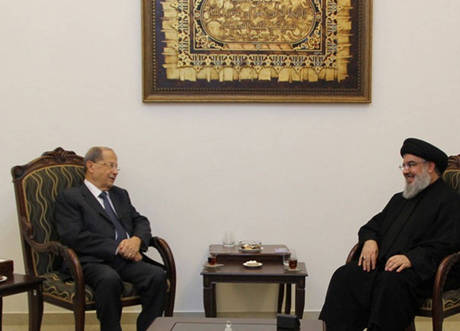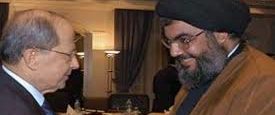The dispute between the FPM and Hezbollah is largely fuelled by a rift between Bassil, who is seen as the “legitimate” heir of Aoun, with the pro-Iran party.

BEIRUT –Criticism of the Iran-backed Hezbollah movement by members of the Free Patriotic Movement (FPM), the party of Lebanese President Michel Aoun, intensified in recent days, an indication that a 2006 understanding between the two groups is in jeopardy.
Reached between Aoun and Hezbollah Secretary General Hassan Nasrallah in February 2006 in the wake of former Prime Minister Rafic Harriri’s assassination, the “understanding of Mar Mikhayel,” defends the ownership of weapons as a “sacred means that is exercised by any group whose land is occupied,” giving cover to Hezbollah’s weapons.
But a dispute between former Foreign Minister Gebran Bassil, who heads the FPM, and Hezbollah’s leadership, has changed the relationship.
وينن جماعة حزب الله يسمعوا حكي زياد أسود سبحان الله كيف قلب عليهن pic.twitter.com/bQdSJBEvpB
— Fouad Nseif (@Fouad_Nseif88) May 20, 2020
The fiercest of criticisms by the FPM came from MP Ziad Aswad, who said during an interview on Thursday that it is impossible to keep on “manning the gun while the people are hungry,” in reference to Hezbollah’s arms.
During the interview on the OTV channel, another member of the FPM, Naji Hayek, called for support for political federalism.
The FPM-owned OTV also reported about an incident in which Hezbollah members allegedly prevented Lebanese customs officers from confiscating smuggled clothes. Other cases of money being smuggled into Syria were also discussed, putting the focus on the Iran-backed movement’s illicit dealings.
The dispute between the FPM and Hezbollah camp is largely fuelled by a rift between Bassil, who is seen as the “legitimate” heir of Aoun, with Hezbollah.
Bassil, who is reportedly preparing to seek the presidency, is making an effort to normalise ties with the US, which has threatened to impose sanctions on him due to his proximity to Hezbollah.
هل ما جاء ببعض من خطاب باسيل الاخير وما جاء على لسان زياد اسود وما يدور في كواليس التيار بداية للانقلاب على اتفاق مار مخايل؟ كما انقلبوا على اتفاق معراب؟ pic.twitter.com/NxCvdJJs1I
— Elie Estephan (@mastermind1971) May 21, 2020
Earlier in May, former US Ambassador to Lebanon Jeffrey Feltman said that the US had cause to impose sanctions on Bassil, noting that he has played a “personal role… in expanding Hezbollah’s grip over Lebanon by giving the organisation Christian cover and serving as a Hezbollah apologist.”
ممالك سقطت كما سبق وقلنا والاتحاد السوفيتي سقط بالرغيف. بكل حال ثمة رغيف مسروق بالفساد حتى اصبح الخوف من الرغيف مرعب فلا تتعجبوا عندما دول تهتز من وراء اداء حكامها فتصبح السيادة والقوة مجرد شعار لان الرغيف اقوى منها .عندما تهربون من محاربة الفساد سنتلو واياكم حتما فعل الندامة pic.twitter.com/DeREDnebXF
— ziad assouad (@ZiadAssouad) May 22, 2020
Bassil has made significant inroads with Washington in recent months, reportedly securing the transfer to Washington of Amer Fakhoury, a Lebanese-American former member of the South Lebanon Army militia that collaborated with Israel during its 18 year occupation. That move sparked outrage from Hezbollah’s leadership and supporters, who view Israel as their arch-foe in the region.
Bassil has also responded to US pressure to isolate Hezbollah, which the US and other Western countries consider a terrorist organisation that does Iran’s bidding.
In late April, German Interior Minister Horst Seehofer declared a total ban on Hezbollah activities in its country and declared the movement a “Shia terrorist organisation.”
Hezbollah has so far refused to back Bassil’s efforts to secure the presidency in 2022, when Aoun’s mandate ends.
بتتذكّروا حركة أمل بمعركة جزين بالإنتخابات شو عملوا ضد زياد أسود وكيف استعملوا كل الأساليب لحتى يحاولوا يخسروه مع إنه المقعد للمسيحية؟
— Charbel … (@elcap0000) May 21, 2020
بوقتها حزب الله وقف مع حركة أمل
حدا من التيار اتّهم حزب الله بالخيانة؟ أو شكّك بورقة التفاهم؟
نحنا تيار وطني حر، ما حدا بيفرض علينا مواقفنا pic.twitter.com/5d8DWCjwzM
US Ambassador to Lebanon Dorothy Shea also reportedly pressured Basil to end his campaign to remove Lebanese Central Bank Governor Riad Salameh.
With Bassil limited in his ability to manoeuvre and as the relationship between Aoun’s party and Hezbollah slowly disintegrates, the future of the alliance that forms the backbone of the Lebanese government is hanging by a thread.
Arab Weekly


Leave a Reply
You must be logged in to post a comment.